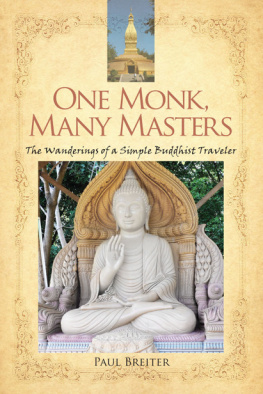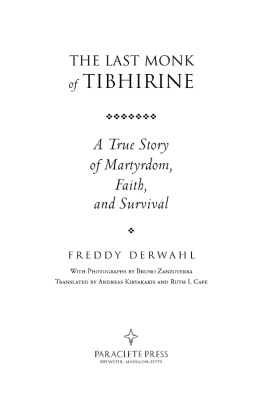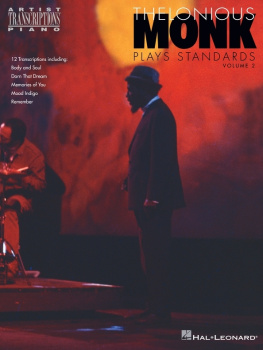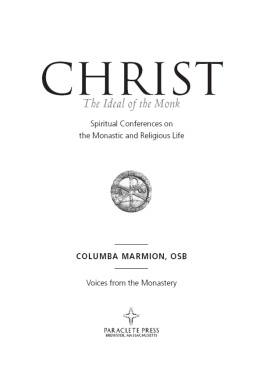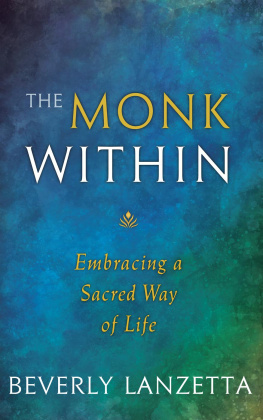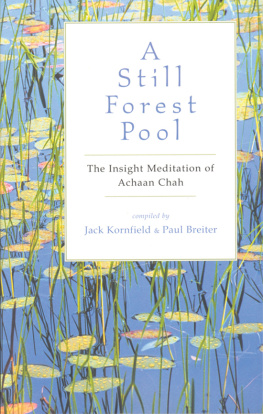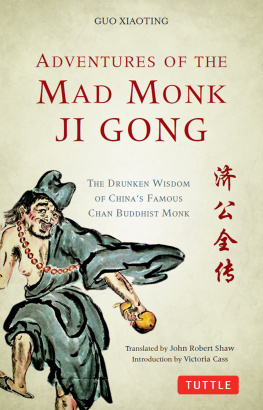Paul Breiter - One Monk, Many Masters
Here you can read online Paul Breiter - One Monk, Many Masters full text of the book (entire story) in english for free. Download pdf and epub, get meaning, cover and reviews about this ebook. year: 2012, genre: Religion. Description of the work, (preface) as well as reviews are available. Best literature library LitArk.com created for fans of good reading and offers a wide selection of genres:
Romance novel
Science fiction
Adventure
Detective
Science
History
Home and family
Prose
Art
Politics
Computer
Non-fiction
Religion
Business
Children
Humor
Choose a favorite category and find really read worthwhile books. Enjoy immersion in the world of imagination, feel the emotions of the characters or learn something new for yourself, make an fascinating discovery.
- Book:One Monk, Many Masters
- Author:
- Genre:
- Year:2012
- Rating:5 / 5
- Favourites:Add to favourites
- Your mark:
- 100
- 1
- 2
- 3
- 4
- 5
One Monk, Many Masters: summary, description and annotation
We offer to read an annotation, description, summary or preface (depends on what the author of the book "One Monk, Many Masters" wrote himself). If you haven't found the necessary information about the book — write in the comments, we will try to find it.
One Monk, Many Masters — read online for free the complete book (whole text) full work
Below is the text of the book, divided by pages. System saving the place of the last page read, allows you to conveniently read the book "One Monk, Many Masters" online for free, without having to search again every time where you left off. Put a bookmark, and you can go to the page where you finished reading at any time.
Font size:
Interval:
Bookmark:
One Monk, Many Masters: The Wanderings of a Simple Buddhist Traveler copyright 2012 by Paul Breiter. Originally published by Parami Press in 2012. Current edition published by Cosimo Books in 2017.
All rights reserved. No part of this book may be reproduced or transmitted in any form or by any means, electronic or mechanical, including photocopying, recording, scanning, or by any information storage and retrieval system without written permission from the publisher.
Developmental editor: Paul Gerhards; Copyeditor: Jessica Swanson; Interior design by Paul Gerhards; Cover Design by Anita Jones, Another Jones Graphics; Cover photographs by Paul Breiter.
Print Book ISBN: 978-1-945934-22-3
Cosimo aims to publish books that inspire, inform, and engage readers worldwide. We use innovative print-on-demand technology that enables books to be printed based on specific customer needs. This approach eliminates an artificial scarcity of publications and allows us to distribute books in the most efficient and environmentally sustainable manner. Cosimo also works with printers and paper manufacturers who practice and encourage sustainable forest management, using paper that has been certified by the FSC, SFI, and PEFC whenever possible.
Ordering Information:
Cosimo publications are available at online bookstores. They may also be purchased for educational, business, or promotional use:
Bulk orders: Special discounts are available on bulk orders for reading groups, organizations, businesses, and others.
Custom-label orders: We offer select books with your customized cover or logo of choice.
For more information, visit www.cosimobooks.com.
To patrons of Buddhism everywhere, especially the humble farmers of Northeast Thailand, who literally keep the Forest Tradition alive. And to Pansak, who embodied so well all that is admirable, and likable, in the Thai character.
T his book began in retreat, in a splendid cabin on sacred land provided by the hidden yogi of the Forest of Awareness Holders. In such a place, positive thoughts arise naturally; what is meaningful in life becomes easily evident; and inspiration, gratitude, and recollection of great beings and spiritual companions overflow. I bow my stubborn bald head at the feet of that yogis guru, Chakdud Tulku.
Thanks that are hard to express are owed to those who have guided me so slightly out of coarseness and immaturity over the decades, especially Ajahn Chah, Ajahn Sumedho, Roshi Kobun Chino, and the teacher of teachers, the lord and protector Lama Gonpo Tseten.
Thanks to the many friends who offered encouragement and suggestions after reading chapters as I produced them through a few years of plodding and pecking away, especially the venerable gang at Abhayagiri Monastery, Andrew Mittelman, and Bonnie Halpern-Cunningham.
When after several rejections I was ready to leave my stories for future generations to publish, the indomitable Paul Gerhards, who is publisher, editor, and staff of Parami Press (now defunct), took on the challenge and spent countless hours over a whole year helping shape the manuscript into form. Telling a would-be author that his work needs revision is a thankless task, but he put his heart, perspiration, and funds into it, along with our copy editor, Jessica Swanson. I can only hope that they learned as much about the creative process as I did from our collaboration.
We are grateful to Shambhala Publications for permission to quote their excellent book Zen Letters: Teachings of Yuanwu, and to Bob Shamis and Jim Roy for providing photographs.
Special thanks to Alex Dake, publisher of Cosimo Books, for offering to put the book back in print, and to his excellent editor Katherine Mason, who very sensitively collaborated with me while deadlines loomed to improve readability and add color to the story.
My wife, Lili, always encourages virtuous activity and is happy to pay the bills while I write things that may never be published and pretend to practice the Buddhas way. Never asking anything in return but only rejoicing in the good others try to do, she is a true inspiration and role model.
M y supremely kind and excellent teachers of the Buddhas Way have passed on. Many Dharma friends and old companions have died; one remarked that we only see each other at funerals now. Many of the places I lived in and traveled to in the 1970s, 80s, and even early 90s are no longer the same. So much of Asia has vanished under the onslaught of the loggers saw, the wrecking ball, and the building crane, been paved over with concrete and asphalt, crowded, choked, and smogged with rapidly expanding populations, smokestacks, and vehicle exhaust. Youd better go see it while its still there, I used to tell people who were thinking about visiting Thailand. So I thought Id better record some memories while my mind and I are still here.
***
It is said that even the pleasant sensation of a cool breeze on a hot day is the blessing of a spiritual teacher. Such pronouncements sound fanciful indeed. Some of us can take them as inspiration for our practice, but for those in need of logic, it is there, too. The basic principle of Buddhism is that everything arises from causes. Like produces like. Pleasant experience results from positive actions, and the discernment to understand what is truly wholesome is learned from a spiritual guide. The positive results we reap in this life are the result of the wholesome actions we learned to perform in the past, whether it be the past of this life or lives before.
What can be more skillful than praising virtuous qualities and telling others of deeds of wisdom, love, and compassion, and appreciating the rarity of the opportunity to meet embodiments of these qualities? We accumulate merit by hearing of the lives of great beings. Wholesome traits blossom and the mind is uplifted. The Tibetan term for spiritual biography, namthar, means complete liberation. That refers to the holy beings we read about in such accounts and the freedom they found in enlightenment, but the stories can also bring freedom and buoyancy to the mind of the reader. Lama Tsedrup Tharchina great, humble, lovable mansuggested such reading as an antidote to depression, one of the plagues of modern life.
***
Geshe Michael Roach, an American teacher of Tibetan Buddhism in the Gelugpa school, tells his audiences that for all he knows, they are all enlightened and just pretending otherwise to make him teach for his own benefit. Maybe no one will find anything of interest here; but for me, the process is inspirational and reconnects me with what has been most meaningful in this life.
There are many others who knew these teachers more intimately, in a personal sense, in appreciating their qualities, and in understanding and realizing their teachings. I have only skimmed along the surfaces of great oceans and vast deep lakes, but one does what one can. At the least, I can give some idea of the legions of transcendent masters and practitioners in the world in the hope that their tireless efforts to transmit their wisdom can result in ordinary people rising out of the mire of suffering and meaninglessness.
The enlightened masters and the institutions of their lineages are truly great, but their purpose is not self-glorification; it is to help people who are struggling to be free of suffering. Thus in close proximity to the teachers are often found confused seekers and just plain silly people (like me). This was the case in the time of the Buddhathe scriptures are full of the most outrageous goings-on of his disciplesand it is certainly true now.
The worldly way of critiquing people and ideas often involves either blind faith or cynical skepticism. The Buddha urged his listeners to take nothing on faith and to put his words to the test, just as gold is burned, beaten, and polished. But there comes a point at which, having seen that everything so far has turned out to be reliable, one experiences a deep trust in the teacher and the teachings and is willing to take things on faith. Ajahn Sumedho, a Western monk of the Theravada Thai Forest Tradition, said, Any fool can say how things should be. It doesnt take any energy to criticize. In ordinary life, we do more than enough fault-finding, and it doesnt bring us a whole lot of benefit. It is also a basic tenet that what we see in others is a projection of our own habit patterns. So let us now praise great beings, and instill habits of respect, reverence, and love for what is truly precious in this world. By contemplating the lives and deeds of people whose experience is beyond our own, we can elevate our minds and infuse them with positive qualities.
Next pageFont size:
Interval:
Bookmark:
Similar books «One Monk, Many Masters»
Look at similar books to One Monk, Many Masters. We have selected literature similar in name and meaning in the hope of providing readers with more options to find new, interesting, not yet read works.
Discussion, reviews of the book One Monk, Many Masters and just readers' own opinions. Leave your comments, write what you think about the work, its meaning or the main characters. Specify what exactly you liked and what you didn't like, and why you think so.

